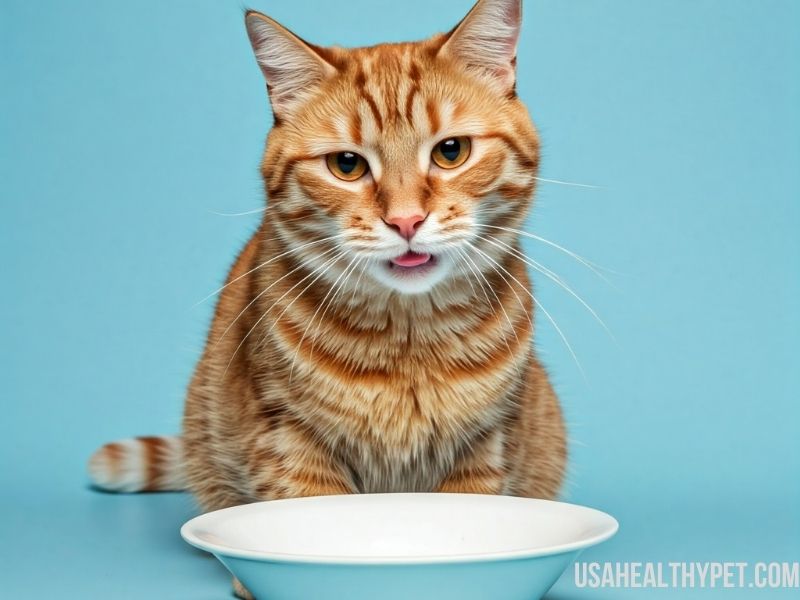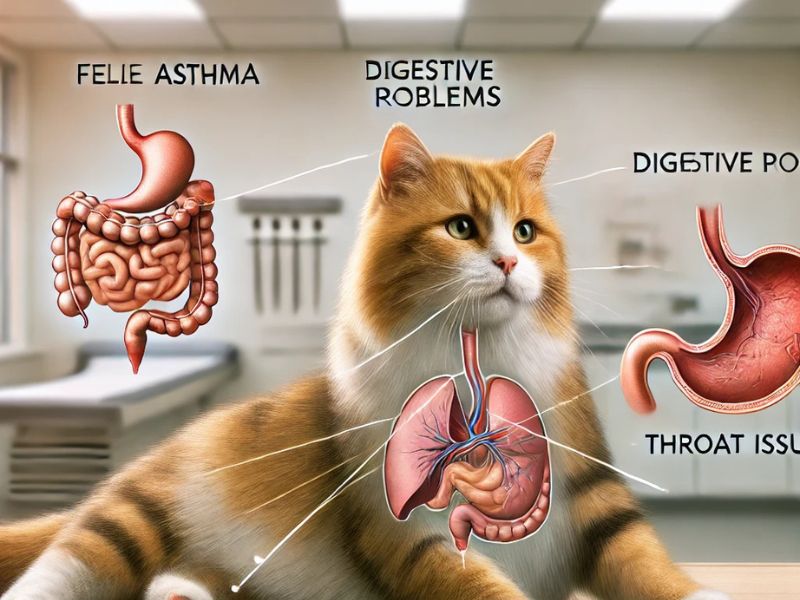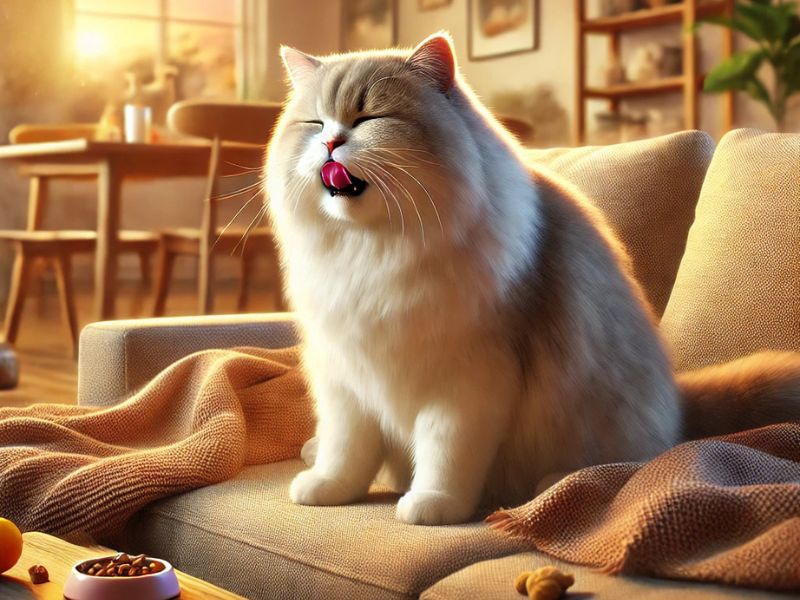Gulping while purring is a behavior that many cat owners notice but rarely understand. While it might seem harmless, it can sometimes indicate an underlying issue that needs your attention.
From hairballs to stress, or even medical conditions like acid reflux or asthma, there are several possible reasons for this behavior.
Here’s the kicker: experts agree that while an occasional gulp might not be alarming, repeated occurrences paired with other symptoms—like coughing or appetite changes—shouldn’t be ignored.
By understanding the potential causes and acting when needed, you can ensure your feline friend stays happy and healthy.
Key Points:
- Fact: Cats purr not only when they’re happy but also when they’re stressed or in pain.
- Quick Tip: Occasional gulping isn’t usually a concern, but frequent gulping might indicate an issue.
- Expert Insight: Veterinarians suggest monitoring additional symptoms like coughing, drooling, or changes in eating habits to determine if gulping is a problem.
- Actionable Advice: Regular grooming, stress management, and hydration can help prevent gulping related to hairballs or stress.
- When to Act: Seek veterinary advice if gulping persists or is accompanied by labored breathing or lethargy.
Why Do Cats Purr in the First Place?
The Many Reasons Cats Purr
Purring is a way of communication for cats. They purr when they’re happy, like during a belly rub session, but also when they’re in pain or stressed. Think of it as their universal “hello, I’m feeling something!”
Is It Always a Sign of Happiness?
Not necessarily! Cats also purr as a self-soothing mechanism, like when they’re injured or feeling unwell. It’s their way of creating calm vibes for themselves, kind of like how we hum to calm our nerves.
What Does Gulping Look Like?
Recognizing the Signs
Gulping often looks like your cat is swallowing hard or repeatedly, even when they haven’t just eaten. You might hear slight clicking noises, see their throat moving, or notice them licking their lips more than usual.
Is It Normal or a Red Flag?
A gulp here and there isn’t usually a big deal. But if it’s happening frequently or comes with other symptoms—like coughing, sneezing, or vomiting—it could mean something’s up.

Common Reasons for Gulping While Purring
Swallowed Hairballs or Food
Cats are fastidious groomers, so hairballs are just part of the package. If a hairball gets stuck or they swallow food too quickly, gulping might follow.
A study published in the Journal of Feline Medicine suggests that 60% of gulping incidents are linked to swallowed hair.
Respiratory Issues
A stuffy nose or mild congestion can make gulping more likely. If their airways feel blocked, they might gulp as a reflex.
Anxiety or Stress
Cats aren’t immune to stress. New surroundings, loud noises, or changes in routine can lead to gulping as a stress response.
Dr. John Bradshaw, a renowned cat behavior expert, emphasizes that stress can manifest in physical ways like gulping or excessive grooming. Providing a stable, predictable environment is key to reducing such behaviors.
Pain or Discomfort
Cats are masters at hiding pain, but gulping while purring might be a subtle sign they’re not feeling 100%.
Medical Conditions That Might Cause Gulping
Feline Asthma
Asthma can cause wheezing and gulping as your cat struggles to breathe normally. It’s usually accompanied by coughing or labored breathing.

Acid Reflux or Digestive Problems
Much like humans, cats can experience acid reflux. This can cause discomfort in their throat, leading to gulping noises.
Oral or Throat Issues
Anything from a sore throat to dental problems could make gulping more noticeable, especially when paired with purring.
How to Respond: When to Worry About Gulping
Observing Their Behavior
Keep an eye on how often the gulping happens. Is it a one-time thing, or is it becoming more frequent?
Key Signs You Should Call the Vet
If your cat shows other symptoms like coughing, drooling, weight loss, or decreased appetite, it’s time to consult a professional.
According to the American Association of Feline Practitioners (AAFP), consistent gulping with signs of distress warrants immediate veterinary attention.
Simple Home Remedies You Can Try
Encouraging Proper Hydration
Cats are notorious for not drinking enough water. Try adding a water fountain to encourage them to sip more often.
Hairball Remedies
Over-the-counter hairball treatments can help if you think that’s the culprit. Grooming your cat regularly also reduces the amount of hair they swallow.
Relaxation Techniques
Stress can be a trigger, so create a calm environment for your cat. This might include quiet spaces or pheromone diffusers to ease their nerves.

When to Visit a Veterinarian
If you’ve tried some home remedies and your cat is still gulping—or if the symptoms seem to be getting worse—it’s best to consult a vet. They can rule out serious issues and give you peace of mind.
How to Prevent Gulping Issues in the Future
Diet Adjustments
Feeding your cat smaller, more frequent meals can prevent them from gulping food too quickly.
Stress Management
Routine is everything for cats. Stick to consistent feeding and playtimes to reduce stress.
Regular Vet Checkups
Yearly visits to the vet can catch potential problems early, keeping your cat healthy and happy.
Conclusion: Keep Calm and Purr On
Gulping while purring can be a little concerning, but it’s usually not a big deal. By understanding the possible causes and keeping an eye on your cat’s behavior, you can ensure they’re happy and healthy.
And when in doubt? Always trust your instincts and check in with your vet.
FAQs
- Is it normal for my cat to gulp occasionally?
Yes, occasional gulping isn’t usually a concern. It’s when it becomes frequent or is paired with other symptoms that you should investigate further. - Can hairballs cause gulping sounds?
Absolutely! Hairballs are a common reason cats gulp, especially when they’re trying to clear their throat. - How can I tell if my cat’s gulping is due to stress?
Look for other signs of stress, like hiding, reduced appetite, or excessive grooming. A calm environment can help ease their anxiety. - What should I feed my cat to prevent gulping?
Opt for smaller, more frequent meals, and consider wet food to ensure they’re staying hydrated. - When should I take my cat to the vet?
If gulping persists or is accompanied by symptoms like coughing, vomiting, or lethargy, it’s time for a professional opinion.